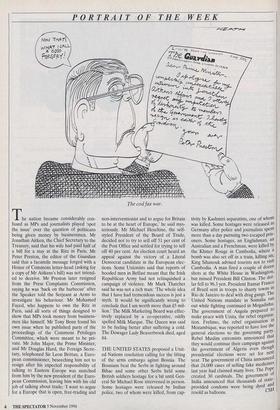PORTRAIT OF THE WEEK
The cod fax war.
The nation became considerably con- fused as MPs and journalists played 'spot the issue' over the question of politicans being given money by businessmen. Mr Jonathan Aitken, the Chief Secretary to the Treasury, said that his wife had paid half of a bill for a stay at the Ritz in Paris. Mr Peter Preston, the editor of the Guardian said that a facsimile message forged with a House of Commons letter-head (asking for a copy of Mr Aitkens's bill) was not intend- ed to deceive. Mr Preston later resigned from the Press Complaints Commission, saying he was 'back on the barbecue' after the Speaker told the Serjeant at Arms to investigate his behaviour. Mr Mohamed Fayed, who happens to own the Ritz in Paris, said all sorts of things designed to show that MPs took money from business- men like himself. Mr Tony Benn found his own issue when he published parts of the proceedings of the Commons Privileges Committee, which were meant to be pri- vate. Mr John Major, the Prime Minister, and Mr Douglas Hurd, the Foreign Secre- tary, telephoned Sir Leon Brittan, a Euro- pean commissioner, beseeching him not to resign after his expected responsibility of talking to Eastern Europe was snatched from him by the new president of the Euro- pean Commission, leaving him with his old job of talking about trade; 'I want to argue for a Europe that is open, free-trading and
non-interventionist and to argue for Britain to be at the heart of Europe,' he said mys- teriously. Mr Michael Heseltine, the self- styled President of the Board of Trade, decided not to try to sell off 51 per cent of the Post Office and settled for trying to sell off 40 per cent. An election court heard an appeal against the victory of a Literal Democrat candidate in the European elec- tions. Some Unionists said that reports of hooded men in Belfast meant that the Irish Republican Army had not relinquished a campaign of violence. Mr Mark Thatcher said he was not a rich man: 'The whole idea that I have had tremendous success is just a myth. It would be significantly wrong to conclude that I am worth more than £5 mil- lion.' The Milk Marketing Board was effec- tively replaced by a co-operative, oddly spelled Milk Marque. The Queen was said to be feeling better after suffering a cold. The Dowager Lady Beaverbrook died, aged 84.
THE UNITED STATES proposed a Unit- ed Nations resolution calling for the lifting of the arms embargo aginst Bosnia. The Bosnians beat the Serbs in fighting around Bihac and some other Serbs held some British soldiers hostage for a bit until Gen- eral Sir Michael Rose intervened in person. Some hostages were released by Indian police, two of whom were killed, from cap-
tivity by Kashmiri separatists, one of whom was killed. Some hostages were released in Germany after police and journalists spent more than a day pursuing two escaped pris- oners. Some hostages, an Englishman, an Australian and a Frenchman, were killed by the Khmer Rouge in Cambodia, where a bomb was also set off in a train, killing six; King Sihanouk advised tourists not to visit Cambodia. A man fired a couple of dozen shots at the White House in Washington, but missed President Bill Clinton. The dol- lar fell to 96.3 yen. President Itamar Franco of Brazil sent in troops to shanty towns In Rio de Janeiro to deal with drug gangs. The United Nations mandate in Somalia ran out while fighting continued in Mogadishu. The government of Angola prepared to make peace with Unita, the rebel organisa- tion. Frelimo, the rebel organisation In Mozambique, was reported to have lost the general elections to the governing party. Rebel Muslim extremists announced that they would continue their campaign against the government of Algeria even though presidential elections were set for next year. The government of China announced that 24,000 cases of selling fake medicines last year had claimed many lives. The Pope created 30 cardinals. The government of India announced that thousands of state- provided condoms were being dyed and










































































 Previous page
Previous page